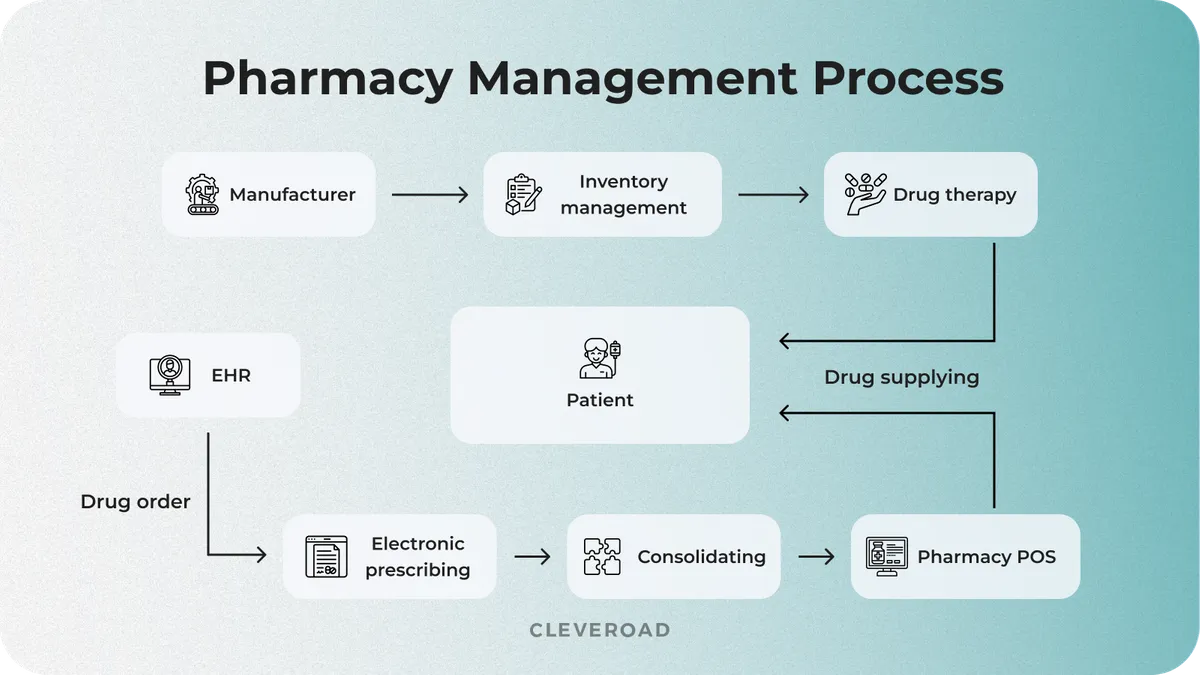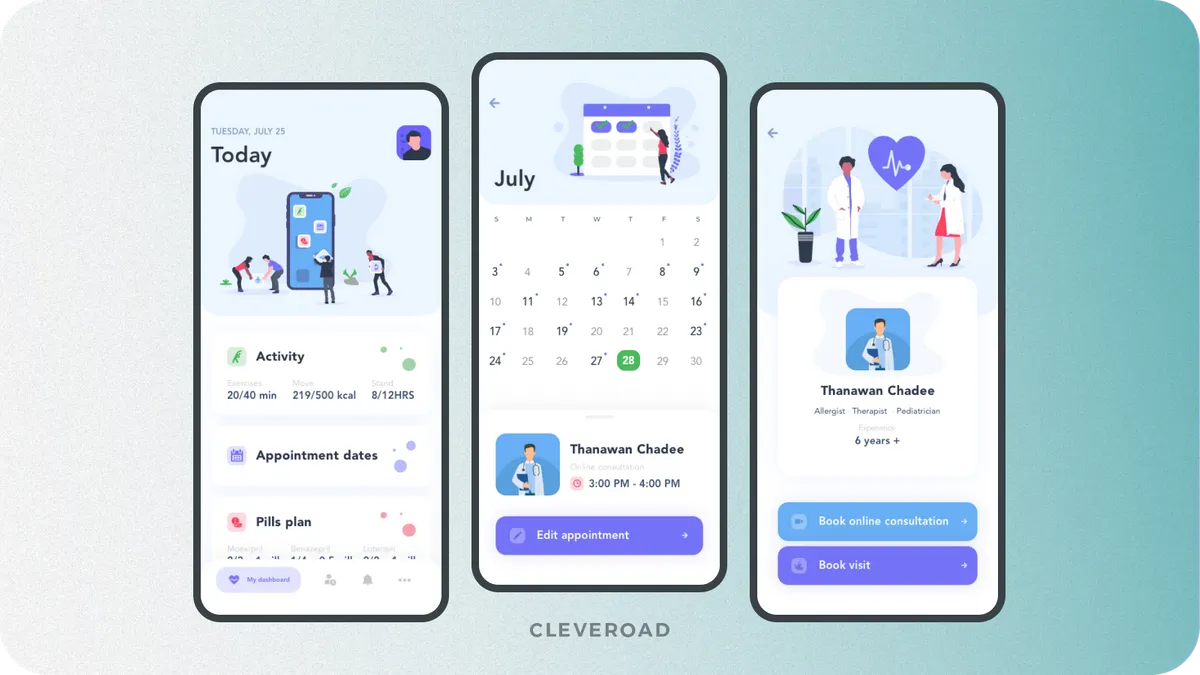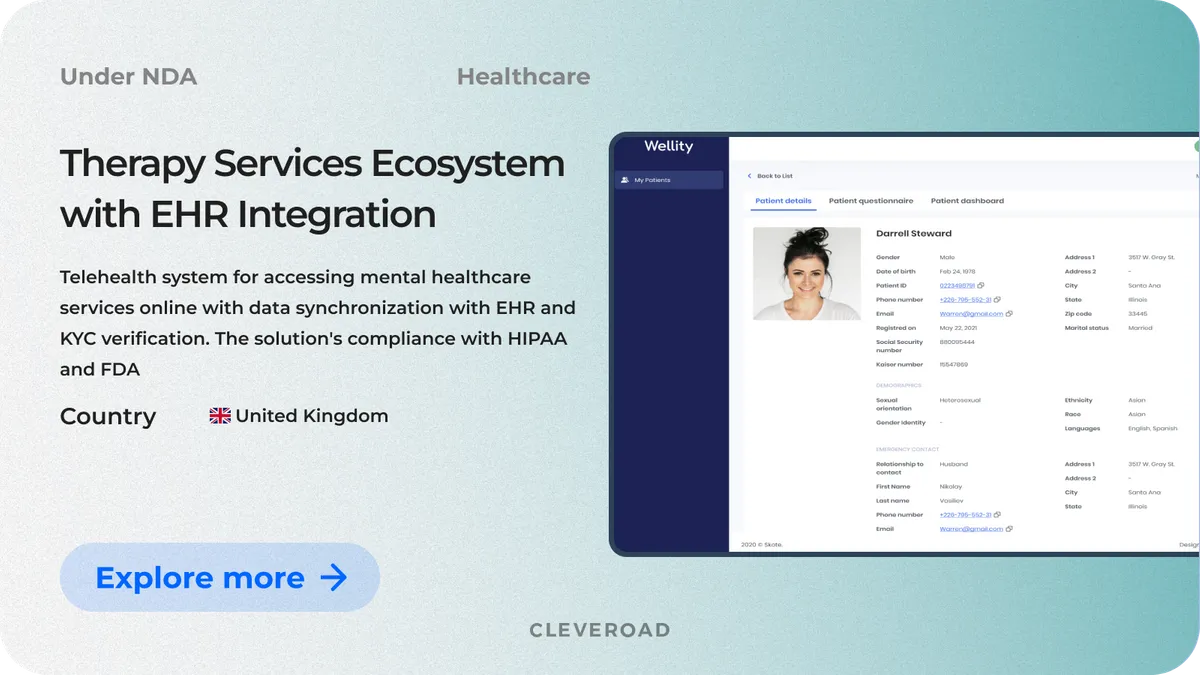How to Create Pharmacy Management System: The Utter Roadmap
Updated 10 Feb 2025
15 Min
622 Views
Pharmacy management software development lets entrepreneurs manage the complexities of day-to-day operations in the pharmaceutical industry, which has become increasingly challenging. Such activities as inventory management and prescription processing, as well as regulatory compliance and patient care, require efficient and streamlined approaches. This is where a pharmacy management system proves to be indispensable.
As an experienced IT provider with 13+ years of experience in healthcare, we will guide you on how to create pharmacy management system to be a valuable asset and how it can benefit your pharmaceutical company in managing its operations effectively.
This article carries valuable information for those who:
- Seek to optimize their pharmaceutical company's inventory management and ensure timely availability of medications
- Strive to enhance patient care and medication adherence, streamline prescription processing, and offer medication reminders
- Need assistance in meeting industry regulatory requirements, maintaining meticulous record-keeping practices, and safeguarding patient information.
Why You May Need a Pharmacy Management System
A pharmacy management system is a software solution designed to streamline and automate various tasks and processes within pharmacies or healthcare facilities. It serves as a central platform that integrates and manages different aspects of pharmacy operations, enabling pharmacists and healthcare professionals to efficiently handle tasks related to medication dispensing, inventory management, patient records, billing, and more.
Here's how the standard pharmacy management process works:

Pharmacy management flow
Pharmacy software can offer a myriad of solutions to address the challenges faced by pharmaceutical companies. Before answering how to create pharmacy management system, let’s take a closer look at its main benefits.
Inventory management
One primary challenge that such software can help with is pharmacy inventory or prescription management. Keeping track of various medications, their quantities, and expiration dates can be a complex task. Aiming at this problem, a pharmacy management system streamlines this process, ensuring optimal stock levels, reducing wastage, and preventing stockouts.
Precise e-prescribing
Another critical aspect where pharmacy management software development proves beneficial is enhancing efficiency and accuracy in prescription processing. By digitizing prescriptions and automating order fulfillment, pharmacy software systems minimize manual errors, improve order accuracy, and expedite the dispensing process, leading to better service and patient satisfaction.
Compliance adherence
Pharmacy management systems can also aid in complying with regulatory requirements and maintaining robust record-keeping practices. The software facilitates precise documentation of sales, inventory movements, and patient information, which is essential for audits and regulatory inspections.
Enhanced insurance claiming
Answering how to create a pharmacy management system, you should remember that it can integrate seamlessly with health insurance providers and facilitate easy claims processing. This integration reduces administrative burden, minimizes paperwork, and accelerates the reimbursement process for pharmaceutical companies, leading to smoother financial operations.
Medication adherence
Another challenge that such healthcare solutions can address is medication adherence. By providing patient profiles, medication reminders, and refill alerts, the software encourages patients to follow their prescribed regimens more diligently, ultimately improving treatment outcomes and reducing healthcare costs.
Refined analytics
These systems can support data analytics and reporting, allowing pharmaceutical companies to gain valuable insights into their business performance, sales trends, and customer preferences. Armed with this data, companies can make informed decisions, identify growth opportunities, and optimize their product offerings.
Solid security
Security is a significant concern in the pharmaceutical industry, given the sensitive nature of patient information and prescription data. Pharmacy management software development prioritizes data security through encryption, access controls, and regular backups, safeguarding against potential breaches and ensuring data privacy.
Planning to go mobile? Learn how your healthcare business can benefit from pharmacy app development
What Features to Implement into Pharmacy Management Software?
When it comes to comprehensive and efficient pharmacy management software development, enterprise-level solutions often consist of various interconnected modules that cater to different aspects of pharmacy operations. These core modules collectively ensure seamless functionality and streamline essential processes. Let’s consider the key modules that should be implemented into pharmacy management software.
Stock handling
The stock handling functionality plays a central role in the medication management of the inventory. It monitors stock levels, tracks expiry dates, and automatically generates alerts for low-stock items. This ensures that the pharmacy always has the right medications available for patients while minimizing the risk of stockouts or wastage.
Automatic dispensing systems
Integrating automated dispensing systems within software for pharmacy management can significantly enhance efficiency. The software tracks inventory in real time, ensuring the right medication is always available when needed. These systems measure and dispense medications precisely, which reduces human error and allows pharmacists to focus on patient care.
E-prescription management
The pharmacy management software development requires e-prescription management. It allows healthcare providers to electronically submit prescriptions directly to the pharmacy, eliminating the need for paper-based prescriptions. The system securely receives and stores electronic prescriptions, enabling pharmacists to process orders quickly and accurately.
We also have a guide on e-prescription app development. Check it out to learn more about its benefits and features
Document and data management
This module centralizes all documents related to pharmacy operations, including supplier information, purchase orders, invoices, and customer records. It stores and organizes files in a structured way, which makes it easy to search, access, and update information. Also, it improves workflow management, ensures compliance, and reduces paperwork errors.
Electronic Patient Records (EPR)
The electronic patient records module is integral in pharmacy management software development, as it securely stores patient information, medication history, allergies, and any relevant health data. This enables pharmacists to make informed decisions, identify potential drug interactions, and provide personalized care.
Billing and insurance processing
Billing and insurance processing streamline billing processes, allowing pharmacists to generate accurate invoices and process insurance claims electronically. It ensures smooth financial transactions and minimizes administrative work, which will enable pharmacists to focus more on patient care.
If you want to develop a standalone solution for billing and insurance processing, check out our guide about how to make medical billing software
Reporting and pharmacy analytics
The reporting module within pharmacy management software development provides comprehensive insights into performance, sales trends, and inventory turnover. Analyzing these data-driven reports helps in making informed business decisions and identifying opportunities for improvement.
Alerts and notifications
Alerts and notifications provide customers with real-time reminders to pharmacists and patients. For example, it can remind patients to take their medications on time or alert pharmacists about potential drug interactions or low-stock items. The system ensures timely actions, improves safety, and enhances overall efficiency in the pharmacy.
Integrations
Pharmacy management software development consumes integrating with other healthcare systems is crucial to enhance data exchange, improve patient care coordination, and facilitate regulatory compliance. You should consider merging your system with Electronic Health Record (EHR) systems, health insurance databases, and lab information systems.
How to Create a Pharmacy Management System in 6 Steps
Let’s move on to learning the core steps you should take to successfully go through pharmacy management software development. Still, you should be aware that the process can’t be executed properly without the assistance of a reliable healthcare vendor. That is why the following stages are described when the IT provider is already selected.
Once you have found an experienced provider for pharmacy management software development, the process can be broken down into several key steps, ensuring a successful and efficient implementation. Let’s discover how to build a pharmacy management software solution on the example of our SDLC (Software Development Life Cycle).
Step 1. First contact
This step implies primarily connecting to your tech vendor. When your request is submitted on our website, it is directed to our Business Development Department. A personal manager with expertise in your business domain will reach out to you within 24 hours to proceed to the next stage. We understand the importance of confidentiality, and if needed, we are ready to sign a Non-Disclosure Agreement (NDA) to protect your information.
Step 2. Solution design stage
In this initial phase, you collaborate with the development team to define the scope, requirements, and objectives of the pharmacy management system. Understanding your specific needs, we can tailor the solution to meet your pharmacy's unique requirements.
The goals of the Solution design stage include:
- Understand your healthcare business needs
- Clarify product expectations
- Define functional scope
- Offer a technical solution
- Calculate the estimate of the required efforts
We also consider any restrictions you may have, such as pharmacy management software development timelines, specific deadlines, budget constraints, collaboration preferences, etc.
At Cleveroad, we offter a free Solution Stage Workshop to find a technical solution for your pharmacy needs
Step 3. Discovery phase
The discovery phase involves in-depth research and analysis of the pharmacy's workflow, existing systems, and processes. Our business analysts research your requirements, management system workflow, and end-users to gain insights into pain points and identify opportunities for optimization. What’s more, at this stage you and your tech vendor decide whether you need a standalone pharmacy management software or an integrated solution into your existing healthcare management system.
Step 4. Development
The development stage involves the actual coding and pharmacy management software development based on the agreed-upon requirements and tech stack. Depending on your needs, you may consider developing a standalone solution or integrating the system into your existing business infrastructure.
This stage involves the actual coding and pharmacy management software development based on the agreed-upon requirements and tech stack. Depending on your needs, you may consider developing a standalone solution or integrating the system into your existing business infrastructure.
If you decide to build autonomous pharmacy management software, it’s better to start with MVP engineering. An MVP allows you to test essential functionalities and gather user feedback before implementing the full-scale system. It is a streamlined version of the pharmacy management system development that focuses on essential functionalities. This approach allows for rapid testing and gathering user feedback to validate assumptions and make data-driven decisions. By delivering a basic working prototype, the MVP accelerates time-to-market and enables iterative improvements.
In case you need to integrate pharmacy management software into your existing business environment, the team makes a proof of concept (POC). This approach validates the concept’s technical feasibility and proves the new module’s interoperability within the existing healthcare infrastructure. In practice, POC may demonstrate how the pharmacy management system can integrate with other medical systems like:
- Electronic Health Records (EHR)
- E-prescribing systems, telehealth platforms
- Remote patient monitoring software
- Accounting and billing systems
- Drug information databases
- Health Information Exchange (HIE) networks

An example of pharmacy solution interface for patients (Source: Dribbble)
Step 5. Release and deployment
After the testing and quality assurance, the pharmacy management system is ready for release and deployment. During the release and deployment phase, the software provider takes care to ensure a smooth and seamless rollout. This is one of the final steps within the development journey, where the focus shifts from development and testing to the actual implementation and use of the software in a real-world environment. Aside from the seamless release, the software development partner provides necessary training to your team.
Step 6. Ongoing support
A reliable software development partner will continue to offer support and maintenance services after the system's deployment. This service may be integral due to the complexity of the pharmacy management solution. This includes bug fixes, functionality, and security updates, enhancements to keep the system running smoothly and up-to-date and help adapt it to the changing needs of your business. This ensures stable system performance and provides effective pharmacy management and quality patient care.
Short-Story Cases On How Cleveroad Successfully Delivered Healthcare Projects
To demonstrate our solid expertise in pharmacy software development, we would like to introduce the two medical projects our team has worked on:
Online therapy services ecosystem
Our client is a mental healthcare services provider based in the United States, specializing in online consultations. They were already using a SaaS solution (Kareo EHR system) but needed a custom platform for their online services. The new platform had to be seamlessly integrated with their existing EHR system and support referral management in alignment with their specific business model.
Our team successfully developed telemedicine software from the ground up, with all the functionality required to provide and receive mental healthcare services to patients. The system’s architecture was designed to be compliant with HIPAA laws.
We seamlessly integrated the software with the current Kareo EHR system to ensure proper data synchronization (appointments and patients' records). The outcome was a powerful and reliable telehealth platform that enables the delivery of mental health services online. By automating existing business processes, our solution empowered the company to excel in the healthcare niche and provide efficient, secure, and convenient therapy care delivery.
- Find out more about the Online Therapy Services Ecosystem case
Healthcare web application
Our client, a UK-based Health Tech business specializing in dietary supplements, partnered with the Cleveroad team to develop a modern pharmacy management solution. The customer needed a web app that allows users to monitor their biological indicators by analyzing data results from laboratories.
Our team designs the product to enable users to obtain valuable insights into their health and also help pharmacists and healthcare providers monitor patient health. By analyzing data results received from laboratories, the app generates a comprehensive list of personalized recommendations on how to improve specific biomarkers using dietary supplements. Moreover, the app takes user activity levels into account by seamlessly integrating with wearable devices like watches and bracelets.
The solution is compliant with HL7 standards to ensure secure data sharing. To merge the data, the app was integrated with Laboratories and 3rd-party services:
- Haut.AI (skin health analysis)
- Eurofins, Lighthouse Labs (Laboratories)
- WeFitter API (wearable device data retrieval)
- DecisionRules.io (recommendation engine after analysis)
The pharmacy management system allows the client to expand their range of services in the healthcare sector and achieve substantial business profit growth.
Here's the opinion of our client left on Clutch on the successful health project delivery.


Points to Consider Before Creating Your Own Pharmacy Management System
Pharmacy management software development is a multistep procedure that implies careful planning and consideration of a range of factors. Before proceeding to development process, there are some critical points to take care of:
Security and measures to implement
Given the sensitive nature of patient data and pharmacy information, security should be a top priority. Thus, you should ensure that your pharmacy management system complies with industry healthcare data security standards such as HIPAA (in the United States) or GDPR (in the European Union).
Cleveroad is an ISO-certified company implementing ISO 9001 quality management systems and ISO 27001 security standards. We utilize the following measures to safeguard against data breaches and unauthorized access:
- Data encryption
- Access controls
- Regular security audits
- Secure user authentication
Regulatory compliance
Different countries have specific regulations and standards for healthcare and pharmacy operations. Before developing the system, thoroughly research the regulatory requirements in your business area. Ensure that the pharmacy management software development system adheres to all relevant regulations, such as those governing electronic health records (EHR), drug dispensing, and privacy policies. Let’s take a look at the essential regulations in different countries:
- United States: HIPAA, FDA, HITECH, etc.
- European Union: GDPR, MDR, IVDR, etc.
- Canada: PIPEDA, CMDR, etc.
- Australia: TGA, Privacy Act, etc.
- United Kingdom: MHRA, Data Protection Act, etc.
Cleveroad’s team has practical experience in creating healthcare software solutions compliant with various industry regulations such as HIPAA, HITECH, HL7, SNOMED CT, CCDA, FDA, DICOM, and more.
Custom vs. ready-made solutions
Decide whether to build a custom pharmacy management system tailored to your needs or opt for a ready-made solution. While ready-made solutions may be quicker to implement, custom systems offer greater flexibility and address unique requirements specific to your pharmacy business.
Tech stack
It's important to choose technologies that will keep your software running reliably and smoothly, as well as allow you to scale and update it as needed. The optional tech stack for pharmacy management software development may incorporate the following technologies (based on our experience):
- Frontend: HTML, CSS, JavaScript, React or Angular (for web apps) or React Native or Flutter (for mobile apps).
- Backend: Python (Django or Flask), Java (Spring Boot), or Node.js (Express.js).
- Database: PostgreSQL, MySQL, or MongoDB for data storage and management.
- Cloud services: AWS or Azure for hosting and scalability.
- Integration: HL7, FHIR, or other healthcare data exchange standards.
Choosing the right partner
Pharmacy management software development system requires a skilled and experienced team. Choosing software development partner, consider the following aspects:
- Expertise in key services. The vendor should have expertise in custom software development, upgrade outdated systems, and create mobile and web apps-delivering high-quality results.
- Industry knowledge. They must understand your business, pharmacy industry standards, and regulations like HIPAA or PIPEDA for pharmacies.
- Proven success. Check a software development company’s portfolio to review their projects, case studies, and examples of successful work in your field.
- Reputation and feedback. See what clients say on platforms like Clutch about them and assess their reliability, service quality, and collaboration approach.
- Strong team. Make sure they have all the specialists you need and keep a stable team throughout the project. It ensures deep product understanding and smooth collaboration.
Cleveroad Experience in Developing Healthcare and Telemedicine Systems
Cleveroad is a reliable healthcare software development company possessing over 13 years of experience. We help businesses of various scales by delivering our full-cycle tech services. The Cleveroad team will smoothly implement clinic and pharmacy management systems, e-prescription, telehealth, and electronic patient record solutions, complying with all of the essential healthcare industry regulations.
Explore our healthcare software development services and how we can help you build high-quality pharmacy management software
What benefits will you get by cooperating with Cleveroad?
- Custom healthcare software development from certified tech engineers with a guaranteed high level of protection for patient data and help pharmacies comply with medical standards and regulatory rules (e.g., HIPAA, GDPR, HL7, HITECH, CDA, etc.)
- Smooth integration of your pharmacy system with other internal and third-party programs (such as Kareo, Bluestream Health, MedlinePlus, etc.) to ensure seamless data exchange
- NDA signing per your request to secure your unique concept and guarantee the full confidentiality of your project data
- Experience in developing healthcare software such as medical billing, healthcare CRMs, appointment scheduling, health insurance software, medical staffing software, etc.
- Free Solution Design Workshop to provide your healthcare business needs with a technical implementation roadmap for pharmacy management software.
- Three flexible models of cooperation: Dedicated Team, Staff Augmentation, and Project-Based
Since 2011, we have completed 200+ successful projects, many of them in the healthcare domain.
View our client from the Healthcare industry, Breanne Butler, says about cooperation with Cleveroad.
Breanne Butler, Client Liaison Officer at Prime Path Medtech™
Automate your pharmacy business
Get a tailored pharmacy management system from experts with 13+ years of experience in healthcare
Pharmacy management software is a digital solution that helps hospital pharmacies streamline their operations, manage inventory, process prescriptions, handle patient information, and track sales. It simplifies the overall workflow and enhances efficiency.
Creating a pharmacy management system is a complex task that requires expertise in software development and a deep understanding of pharmacy workflows. It is wise to apply to a reliable tech vendor with experience in developing such systems. A reliable vendor will have the necessary skills to gather requirements and design, develop, test, and deploy the software effectively. They will also provide ongoing support and ensure that the final product meets your business needs. By choosing a reliable tech vendor, you can ensure the successful creation and implementation of a pharmacy management system tailored to your specific requirements.
Businesses need a pharmacy management system when they face challenges in organizing inventory, tracking sales, processing prescriptions, or managing patient information. It becomes necessary as the business grows and manual processes become cumbersome.
The cost of creating a pharmacy management system can vary depending on factors such as the complexity of features, technology used, team size, and development time. Generally, it can range from a few thousand to tens of thousands of dollars. It's recommended to get a customized quote from a software development company based on your specific requirements.
The development timeline for a pharmacy management system can range from 4 to 6 months for an MVP and 6 months to a year for a full solution with integrations. However, the exact duration depends on specific requirements and system complexity.

Evgeniy Altynpara is a CTO and member of the Forbes Councils’ community of tech professionals. He is an expert in software development and technological entrepreneurship and has 10+years of experience in digital transformation consulting in Healthcare, FinTech, Supply Chain and Logistics
Give us your impressions about this article
Give us your impressions about this article
